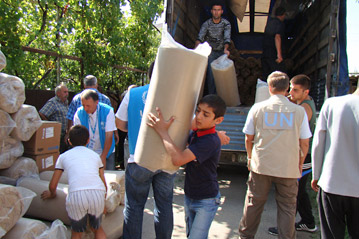UNHCR distributes first aid in Georgia-South Ossetia "buffer zone"
UNHCR distributes first aid in Georgia-South Ossetia "buffer zone"

KARALETI, Georgia, September 18 (UNHCR) - With tears in their eyes, delighted villagers welcomed UNHCR and its partners Wednesday as they made the first distribution of relief items in the Russian-controlled buffer zone between the Georgian town of Gori and the South Ossetian administrative border.
UNHCR delivered blankets and kitchen sets for 29 families in Karaleti, while the French non-governmental organization Première Urgence distributed foldable beds, mattresses and hygiene kits. UNICEF, the UN children's fund, contributed buckets, jerry cans and soap to the same families.
The distribution took place on a sunny day at the village administrator's house, where families congregated with horse carts and traditional motor tricycle carts called arabas to take their relief goods home.
Little village boys, delighted with the unusual action, put aside their football and rushed to help transfer the goods. They vied for the heaviest and bulkiest items to show off how strong they were.
Two old men, who said their houses had been completely destroyed, emotionally thanked the whole relief team after collecting the items for their families.
A man in his thirties, previously the owner or the largest shop in the village, has been left with nothing after the destruction of his shop. He told aid workers he felt humiliated having to rely on assistance now, but at the same time was happy to see the world had not forgotten the plight of the village.
Karaleti is one of four villages that UNHCR was able to visit for the first time last weekend, paving the way for the relief distribution mission. Together with the village administrator, UNHCR has determined that 80 percent of the inhabitants who fled their homes to escape the fighting that broke out in early August over the neighbouring breakaway region of South Ossetia have now returned. Destruction of houses in the village is not as great as had been feared.
Because parents are bringing their children back to Karaleti, UNICEF handed school items and play materials for 160 children to the headmaster of the local school, which is about to reopen.
"Those educational materials and toys give the pupils some joy and make it easier for them to resume schooling after all they have gone through," the headmaster said, clearly delighted with the donation.
Following a detailed profiling of internally displaced persons in Georgia completed last week, UNHCR revised the number of people displaced by the August conflict. A total of 163,000 people were forced to flee their homes, including 127,000 displaced in Georgia proper and another 36,000 to North Ossetia in the Russian Federation. Most of those who fled to North Ossetia have already returned. It is unknown how many people were displaced in South Ossetia during the conflict.
Of the 127,000 internally displaced people in Georgia, 68,000 have since returned home. UNHCR and the Georgian government estimate that another 5,000 will go home before the onset of winter, which would bring the number of returnees to 73,000.
By Melita H. Sunjic in Karaleti, Georgia









